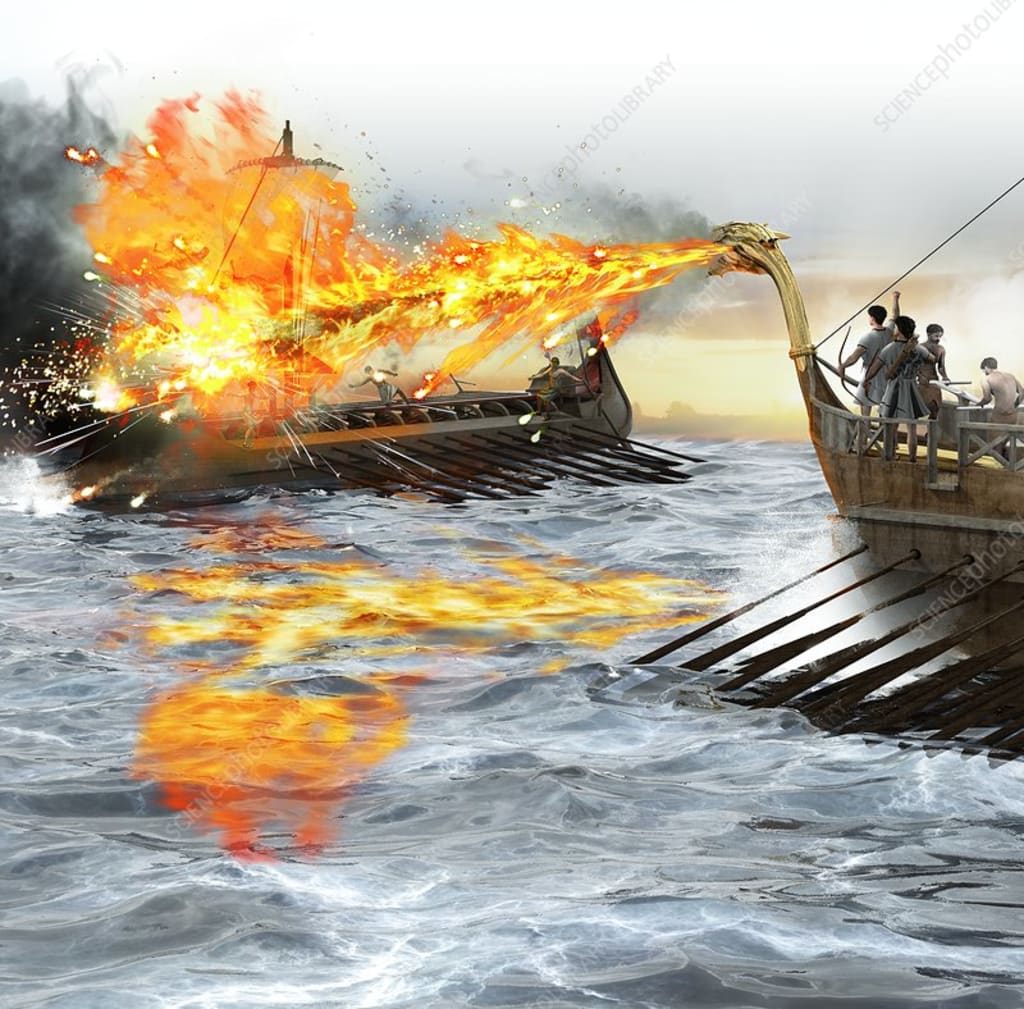
Imagine a weapon so formidable that it struck fear into the hearts of enemies and safeguarded an empire for centuries. This is the story of Greek Fire, an ancient incendiary weapon that epitomized the ingenuity and tactical prowess of the Byzantine Empire. Devised in the 7th century, Greek Fire was a state secret, a lethal weapon that could devastate enemy fleets and fortifications with a ferocity that has echoed through history.
Greek Fire was a liquid substance that could be ignited and projected onto enemy targets, continuing to burn even on water. The precise composition of Greek Fire remains a mystery to this day, guarded closely by the Byzantines and lost with the fall of the empire. This shroud of secrecy has only added to its legendary status. What we do know is that Greek Fire was likely composed of a mixture of ingredients such as naphtha, quicklime, sulfur, and other incendiary materials. The mixture could be sprayed through siphons mounted on ships or thrown in pots, creating a wall of fire that was nearly impossible to extinguish.
The introduction of Greek Fire came at a critical time for the Byzantine Empire, which was facing relentless assaults from Arab forces. The empire needed a game-changing weapon to protect its territories and maintain control over vital maritime routes. Greek Fire provided that edge. It was first used to devastating effect during the siege of Constantinople in 678, where the Byzantines successfully repelled a massive Arab fleet. The weapon's impact was immediate and profound, establishing Greek Fire as a cornerstone of Byzantine naval strategy.
What made Greek Fire so terrifying was not just its destructive power but its psychological impact. Accounts from the time describe the horror of witnessing a liquid inferno that clung to ships, water, and even human flesh, burning with an intensity that could not be doused by conventional means. This psychological warfare aspect, combined with its physical devastation, made Greek Fire an unparalleled tool of war.
The method of deploying Greek Fire was as ingenious as the substance itself. The Byzantines developed specialized siphon-equipped ships, known as dromons, to project the flaming liquid onto enemy vessels. These siphons operated much like modern flamethrowers, creating streams of fire that could reach considerable distances. This technology gave the Byzantines a significant tactical advantage in naval battles, allowing them to control the seas and protect their empire from seaborne invasions.
Despite its formidable power, Greek Fire required expert handling and precise conditions for effective use. The Byzantines maintained strict control over the production and deployment of Greek Fire, ensuring that its secrets did not fall into enemy hands. This control was so effective that even today, the exact recipe and mechanisms remain largely speculative, shrouded in the mists of history.
The legacy of Greek Fire extends beyond its immediate military applications. It represents a pinnacle of ancient military engineering and innovation, highlighting the sophisticated understanding of chemistry and technology possessed by the Byzantines. The impact of Greek Fire on medieval warfare was significant, influencing the development of similar incendiary weapons and tactics in subsequent centuries.
As we reflect on the significance of Greek Fire, we are reminded of the potent combination of innovation and secrecy that can transform the course of history. This ancient weapon, born from the need to defend an empire, continues to captivate historians and military enthusiasts alike. Its story is not just one of destruction but of strategic brilliance and the relentless pursuit of technological superiority.
In conclusion, Greek Fire stands as a testament to the ingenuity and tactical acumen of the Byzantine Empire. Its enduring legacy highlights the power of innovative warfare and the strategic importance of maintaining technological secrets. As we continue to explore the annals of history, Greek Fire serves as a vivid reminder of the profound impact that a single invention can have on the course of human events. Its tale is a beacon of ancient military prowess that continues to inspire awe and fascination, bridging the gap between the past and the enduring quest for innovation in the art of war.
About the Creator
Marveline Merab
“History never repeats itself. Man always does.”
― Voltaire
Enjoyed the story? Support the Creator.
Subscribe for free to receive all their stories in your feed. You could also pledge your support or give them a one-off tip, letting them know you appreciate their work.






Comments
There are no comments for this story
Be the first to respond and start the conversation.